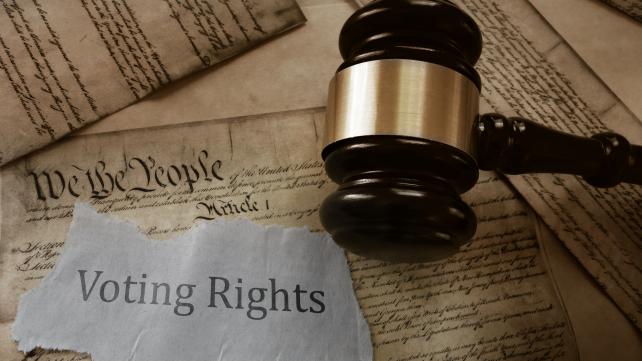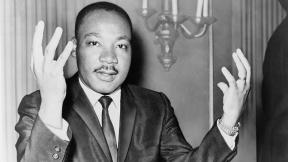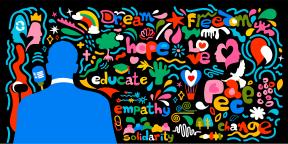
Once the Civil Rights Acts of 1964 was passed, Dr. Martin Luther King Jr began working to register African-Americans in the South, since this part of the country had suppressive voting laws. In 1965 King led the march in Selma, Alabama to increase the percentage of African-American voters in the state. His efforts this “Bloody Sunday” were thwarted by police wielding billy clubs, tear gas, and cattle prods to turn him and the crowd of peaceful demonstrators back.
The fight to ensure voting rights for all American citizens has been waged for two centuries. The right to vote in colonial America was denied to Jews, Catholics, non-European ethnic minorities, women of any race, and African-Americans enslaved or free. When George Washington became president, only six percent of the population was eligible to vote. For nearly 100 years after America became a nation, the reality was that only white American Christian males were eligible to vote
The passage of the 13th amendment in 1865 that freed enslaved peoples in the Union (not confederate states, though) was met with all southern states passing restrictive laws known as “Black codes”, which denied civil and suffrage rights to African-Americans. The 15th amendment of 1870 technically gave African-American males the right to vote – albeit on paper only. The Dawes Act of 1887 technically gave Native Americans the right to citizenship if they disassociated themselves from their tribe, but it wasn’t until the Snyder Act of 1924 that Native Americans born in the U.S. were granted citizenship and thus, voting access. In 1943 the passage of the Magnuson Act lifted the technicality that disallowed citizenship and voting rights to Chinese-Americans who had lived in the U.S. since the early 1800s.
The passage of the Voting Rights Act of 1965 was the only legislation that guaranteed America’s diverse ethno-cultural groups the right to vote and effectively removed all these “technicalities”. That was 189 years from the country’s founding on the principles of the inalienable rights of men, actually granting some of those rights to the men who lived, worked, and fought for its existence.
The struggle to protect voting rights has continued 57 years after 1965. These technical difficulties impact all Americans. In 2020 the Council of Islamic American Relations (CAIR) called for an investigation after hundreds of ballots from voters with Arabic names were disqualified in Lackawanna, New York.
After unsubstantiated and unproven claims of voter fraud in the 2020 elections, Republican legislators in 19 states have passed 34 laws that restrict voter access to the polls. In an unprecedented move, more than 440 bills with provisions that restrict voting access have been introduced in 49 states in the 2021 legislative sessions.
Democrat and Independent legislators in 2021 countered these efforts with 62 expansive laws in 25 states. The expansive legislation does not outweigh the impact of the restrictive laws because they are in many different states. America is again becoming a place similar to what Dr. Martin Luther King faced in the 1960’s ,where access to the right to vote is impacted by the state in which the voter resides. Again, we see most southern states like Texas, Arizona, Georgia, and Florida as well as middle states like Wisconsin, Wyoming, and Missouri with restrictive laws.
With the introduction of that many attempts at voter suppression, many citizens may be adversely impacted. According to the Brennan Center for Justice tracking of voting laws, citizens in some states will find legislation that will:
- Shorten window to apply for a mail ballot
- Shorten deadline to deliver mail ballot
- Make it harder to remain on absentee voting lists
- Restrict assistance in returning a voter’s mail ballot
- Limit the number, location, or availability of mail ballot drop boxes
- Impose stricter signature requirements for mail ballots
- Impose harsher voter ID requirements
- Increase barriers for voters with disabilities
- Ban snacks and water to voters waiting in line
- Eliminate Election Day registration
- Reduce polling place availability (locations or hours)
- Limit early voting days or hours
Imagine older, disabled or economically challenged citizens’ new difficulty in mailing or getting absentee ballots. Imagine immigrant and ethnic minorities meeting variable ID requirements. Imagine citizens driving long distances to find a polling place or struggling with their work schedules in districts with reduced or eliminated voting days or hours.
Does America need another bloody voting rights demonstration? Have the efforts of Dr. Martin Luther King and all civil rights activists been in vain?
The question is “technically” not as ridiculous as it may seem. The violent mob insurrection and attempted coup in the U.S. Capitol in January of 2021 was a live and real-time demonstration of the extent to which some Americans will go to express their disapproval of the voting process. On the anniversary of the January 6 attempted coup, former US President Jimmy Carter warned “Our great nation now teeters on the brink of a widening abyss. Without immediate action, we are at genuine risk of civil conflict and losing our precious democracy."
MLK Day is a reminder of the voting struggle. Many Americans volunteer on MLK Day since it is designated as a day of service. However, for many Americans, MLK day is simply a day off of work. The discrepancy lies in the historical suppression of the holiday which left a climate of first reluctance, and later ignorance of the volunteering aspects of the day. Nonetheless, MLK day is a day of reflection. Reflect on the significance of having the right to vote. Reflect on how long it took for that right to be guaranteed. Reflect on how you personally can ensure that the right to vote is protected and maintained.
Apathy is not an option.
“…In the past, apathy was a moral failure. Today, it is a form of moral and political suicide.” – Dr. Martin Luther King






Add new comment